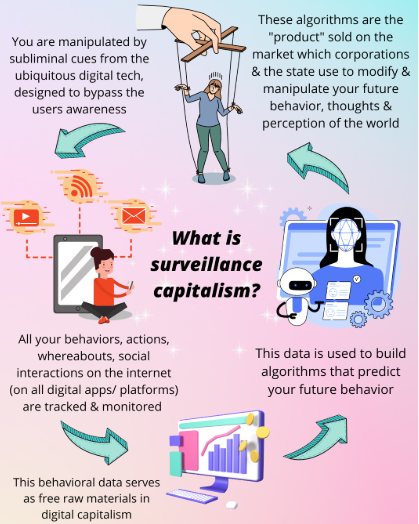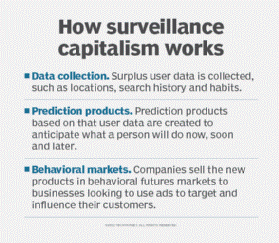Surveillance Capitalism: The Threat to Privacy and Autonomy
Syllabus:
GS-3:
IT & Computers
Focus:
Surveillance capitalism has raised serious concerns as tech giants like Google, Meta, and Amazon increasingly collect and monetize personal data. Recent global debates on data privacy, AI-driven behavioral manipulation, and state surveillance highlight the urgent need for stronger regulations to protect individual autonomy and democratic institutions.
Understanding Surveillance Capitalism:
Definition and Concept
- Surveillance capitalism is an economic system where personal data is collected, analyzed, and monetized to predict and influence human behavior.
- Coined by Shoshana Zuboff in The Age of Surveillance Capitalism (2018), it describes a new economic order that commodifies human experience for corporate profit.
- Unlike traditional capitalism, which focuses on goods and services, surveillance capitalism extracts behavioral data as raw material.
How It Works
- Tech giants like Google, Meta, and Amazon collect and process vast amounts of user data.
- This data is used for predictive analytics, targeted advertising, and content personalization, subtly shaping consumer behavior.
- Recommendation algorithms and social physics models make individuals more predictable economic actors, reinforcing corporate control.
What is Data Privacy?
- A branch of data security concerned with the proper handling of data, including consent, notice, and regulatory obligations.
- Became a major concern after the Cambridge Analytica scandal, where data from 50 million Facebook users was breached.
- Recognized as a basic human right in the digital era due to the extensive integration of technology in daily life.
What is Net Neutrality?
- The principle that Internet Service Providers (ISPs) should provide equal access to all online content and applications.
- Prevents ISPs from blocking, throttling, or prioritizing specific websites or services.
- Ensures a free and open internet, fostering competition and innovation.
Big Data:
- Refers to extremely large volumes of structured and unstructured data that cannot be efficiently processed using traditional methods.
- Characterized by the 3Vs:
- Volume – Huge amounts of data generated daily.
- Velocity – High-speed data processing in real time.
- Variety – Different types of data (text, images, videos, etc.).
- Used in industries for customer insights, personalized marketing, and decision-making.
- Employs advanced computing, machine learning, and analytics to predict user behavior.
- Commonly sourced from social media, e-commerce platforms, and IoT devices.
How Surveillance Capitalism Differs from Traditional Capitalism
Industrial Capitalism vs. Surveillance Capitalism:
| Aspect | Industrial Capitalism | Surveillance Capitalism |
| Primary Resource | Labor, raw materials | Human experience, behavioral data |
| Profit Model | Production & efficiency | Data extraction & behavioral prediction |
| Core Objective | Maximizing productivity | Influencing consumer decisions |
| User Role | Worker or consumer | Consumer and data provider |
- Traditional capitalism focuses on tangible goods and labor exploitation, while surveillance capitalism profits from behavioral control.
- In this system, users are both consumers and raw material, making every interaction monetizable.
Instrumentarian Power:
- Described by Zuboff, instrumentarian power does not rely on coercion but instead shapes behavior using subtle digital nudges.
- Algorithms ensure continuous engagement, guiding users toward choices that benefit tech giants over individual autonomy.
Privacy Concerns and State Surveillance:
Collaboration Between Tech Companies and Governments
- Governments increasingly depend on private tech firms for intelligence gathering, policing, and surveillance.
- Instead of building independent surveillance networks, states access private user data through:
- Legal agreements (data-sharing policies)
- Extra-legal methods (unauthorized access or cyber infiltration)
- This merger of corporate and state surveillance reduces democratic accountability.
Surveillance Beyond Social Media
- Facial recognition, smart devices, and location tracking enable mass surveillance beyond online activity.
- Governments use data-driven insights for predictive policing, political profiling, and social control.
- Deregulation policies favor corporate data autonomy, allowing unchecked mass surveillance.
Impact on Autonomy and Democracy:
Erosion of Individual Autonomy
- Every action online—searches, clicks, purchases—is recorded and analyzed.
- AI-powered recommendations subtly influence decisions, shaping:
- Consumer preferences
- Political opinions
- Social behaviors
- Over time, this erodes free will, as individuals are conditioned by algorithmic influence rather than independent thought.
Threat to Democracy
- The Cambridge Analytica scandal (2014) revealed how data was exploited to influence elections, raising concerns over:
- Targeted political advertising
- Manipulation of voter behavior
- Threats to free and fair elections
- When corporations control information flow, they control narratives, weakening democratic institutions.
Challenges in Regulation and Possible Solutions:
Regulatory Gaps and Corporate Resistance
- Global laws like EU’s GDPR and India’s Digital Personal Data Protection Act (DPDPA) attempt to protect privacy.
- However, these laws fail to address the root problem:
- Data remains a commodity
- Regulations often favor corporate interests
- Tech companies resist stronger oversight through lobbying
Need for Stronger Policies
- Breaking monopolies: Stricter anti-trust laws to reduce tech giants’ dominance.
- Greater transparency: Companies must disclose how data is collected, stored, and used.
- User empowerment: Stronger data rights, allowing individuals to opt-out of data collection.
- Global cooperation: International agreements to regulate cross-border data sharing and surveillance practices.
Conclusion:
Surveillance capitalism has transformed personal data into an economic asset, shaping global markets, politics, and individual autonomy. While technology offers convenience, unchecked data collection threatens privacy, democracy, and human rights. Governments must enforce stricter regulations and promote ethical tech policies to restore user autonomy and curb corporate overreach.
Source: IE
Mains Practice Question:
Discuss the impact of surveillance capitalism on individual autonomy, democracy, and privacy. How do corporate and state interests benefit from data commodification, and what policy measures should be taken to regulate surveillance capitalism effectively? (250 words)





